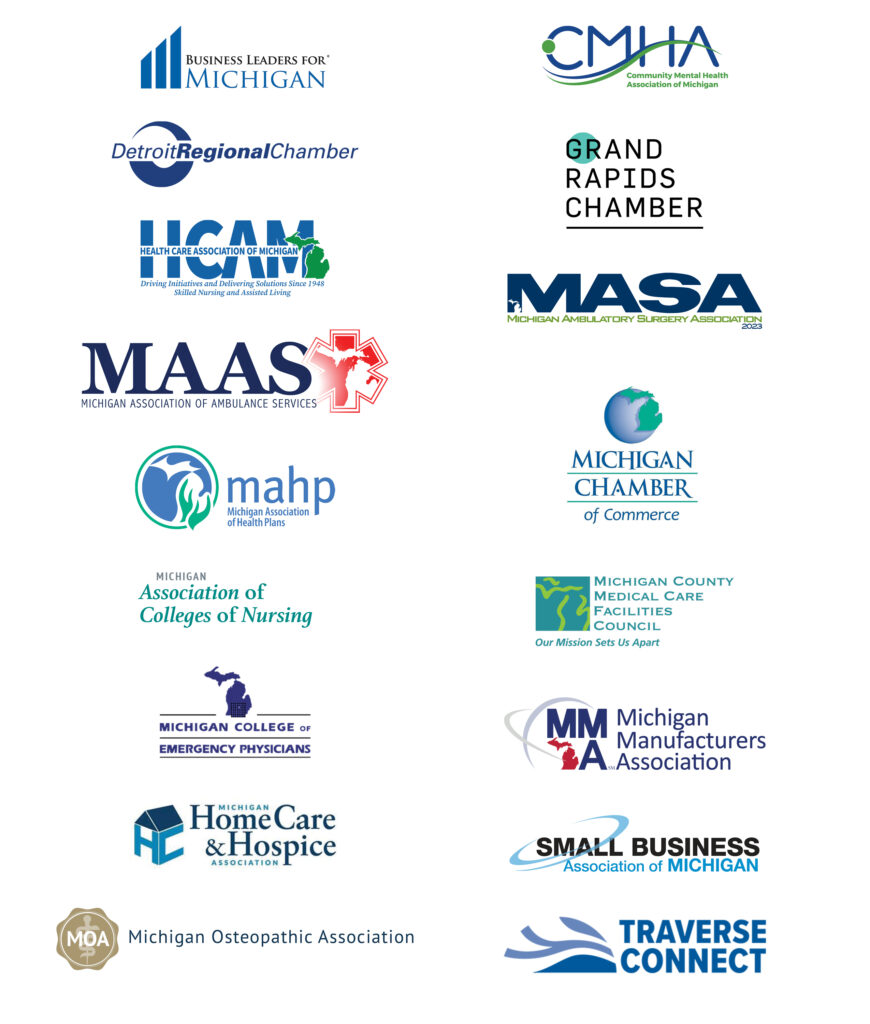Resources
Hospital Nurse Staffing Facts
Michigan Nurses More Than a Number
Protecting Safe Nurse Staffing Flexibilities
Michigan hospitals are focused on addressing staffing challenges and implementing safe nurse staffing models that provide the best quality care for their patients and communities. Senate Bills 334 – 336 and House Bills 4550 – 4552 propose harmful registered nurse (RN) staffing requirements that would damage healthcare and communities by restricting important access to healthcare services for Michigan patients.
The proposed legislation will not solve staffing shortages. Instituting a one-size-fits-all approach places hospitals in an untenable situation: either accept financial penalties for fulfilling the mission of providing care to those who need it or turn patients away and risk a worse outcome for a person in need of care. In addition, it will cost Michigan hospitals approximately $1.1 billion to comply with the potential law change, leading to hospital closures, removal of service lines such as obstetrics and ultimately higher healthcare costs. Overall, it will significantly prolong the time it takes for a patient to receive care in many communities.
One-Size-Fits-All Ratios Will Harm Patients
A diverse coalition of healthcare, business and advocacy organizations published a letter to members of the Michigan Legislature Nov. 7, 2023 opposing the proposed legislation which threaten to put patient care at risk across Michigan. The coalition emphasizes that mandatory nurse staffing ratios have a broader impact beyond hospitals alone, affecting all healthcare providers’ ability to hire nurses.
Impact on Patient Care
A survey of 109 Michigan hospitals conducted in July 2023 shows Michigan is at risk of losing up to 5,100 hospital beds across the state if this legislation is implemented. Michiganders do not deserve to lose access to care.
What 5,100 hospital beds looks like
![]()
Michigan risks losing 1 of every 5 hospital beds from its total statewide bed capacity.

The loss in beds is equivalent to the total hospital bed capacity for New Hampshire and Maine combined.

Losing 5,100 beds is the equivalent to the state losing Michigan’s six largest hospitals.

The loss in statewide capacity would be the same as if all hospitals north of Grand Rapids and Flint closed.
Nurse Staffing Needs

Results from the MHA member survey indicate Michigan hospitals would need to hire at least 13,000 more nurses to comply with the mandated ratios, which is the equivalent of every licensed and working RN in the state of New Hampshire. This is despite a national nursing shortage that has Michigan hospitals currently seeking to hire 8,438 nurses.
How Hospitals Can Help
- Contact your lawmaker through the MHA Legislative Action Center, by phone or at district events to express the negative impact that will happen to patient safety and quality if this legislation were to pass.
- Share testimonials from nurses in your organization with the MHA about how state mandated RN ratios will impact patient care in your hospital.
How Hospitals Are Addressing Staffing Challenges
- The MHA launched a statewide public awareness campaign targeting high school students and professionals considering a career change to express the value of healthcare careers. Learn more at MiHospitalCareers.com.
- Obtained a total of $300 million in state funding that has benefitted at least 69,000 healthcare workers for the purposes of the recruitment, retention and training through Public Act 9 of 2022 and Public Act 5 of 2023.
- Secured additional nurse training opportunities including expanded state policy allowing four-year BSN programs at community colleges.
- Expanded Michigan Reconnect to allow funds to support Michiganders moving from a licensed practice nurse (LPN) to a registered nurse, or from a patient care technician certificate to a LPN.
- Provided emotional well-being support to healthcare workers through a partnership with the Duke Center for Healthcare Safety and Quality that has so far assisted 5,000 healthcare workers from 144 organizations throughout Michigan.



